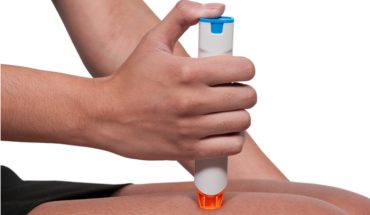First Aid for Children video featuring Emma Hammett of First Aid For Life
Transcript
News presenter: A hard-hitting campaign’s been launched, urging parents to learn basic first aid. Now, please be warned that Mike McCarthy’s report contains video of the new advert, which does contain pictures of a child falling from a tree. –
Advert Narration: The powerful new advert from an award-winning director examines the moment a parent faces the panic and helplessness of trying to save his unconscious son.
[boy falls from climbing tree]
Advert [Father]: Say something, buddy!
Adervt Narration: She can be the difference between life and death. But what she can’t do is be there every time.
Advert [Father]: Help!
Mike McCarthy: It’s a situation that Siobhan Fullwood faced for real, when her daughter Grace began to choke.
Siobhan Fullwood: Grace was sitting in the front room, she was sucking a lollipop. The lollipop came off its stick, and stuck in her throat. She came into the kitchen towards me. And I could tell something was wrong straight away. And she wasn’t making any noises, she was just very pale. And I said, “Is the lollipop stuck?” And she just nodded.
So what I did, instinctively, even though I haven’t been trained, is I slapped her on the back, not in the right place unfortunately. Look Grace, here comes the ambulance.
Mike McCarthy: Siobhan admits that Grace was saved through luck, rather than any understanding of first aid. Many others are not so fortunate.
At Land of Play in Manchester, parents know their kids are in a safe environment. Have they ever thought what they would do in a first aid emergency?
Parent 1: My son had a fit and it was a febrile convulsion when they overheat. There’s nothing you can do about it when they’re having the fit, but that frightened me. So I did a course. –
Parent 2: I wouldn’t feel confident to go and help them, ’cause I’d probably just make it worse.
Parent 3: Up till now, I’ve not really thought about it. But we have been lucky that we’ve never had any real serious incidents with the children. I think until you have a serious incident with your child, then maybe you don’t think about doing a first aid course.
Mike McCarthy: (quiet muttering) As a result of her experience, Siobhan decided to take a first aid course. Far better, says St. John Ambulance, than facing a lifetime of regret.
[Advert – father with son on the ground]
Advert [Father]: Help!
Mike McCarthy: Mike McCarthy, Sky News.
News presenter: And joining us from our Westminster studio is Emma Hammett, a nurse and first aid trainer at First Aid for Life Good morning to you So, we see there it can mean the difference between life and death. For those people in any doubt as to the importance of first aid skills, what would you say?
Emma Hammett: I think it’s absolutely crucial. A practical first aid training course makes a massive difference. We have lots of people who come to us, prompted by an accident that’s happened.
We’ve also that have come on our course, and then have felt empowered afterwards, and have had something happen, and have written us fantastic letters to say thank you. So it works both ways, but it’s very sad that it’s something going wrong, or that feeling of helplessness that prompts people to contact us.
News presenter: And do enough people have these skills, do you think? If we’re looking at the population, then what sort of percentage do you think, of people actually know what to do in an emergency?
Emma Hammett: Actually, a scarily small proportion. And there’s a lot of people that think they know. Things like burns. And, I mean the thing about first aid is that first aid is what you do in that first initial, immediate moment. And it’s knowing what to do then that makes the difference. So things like burns, actually knowing to put it straight under cool running water, and keeping calm, and having that knowledge so that you are able to do it, is an amazing feeling. And it should be a very reassuring feeling.
News presenter: And how important is it for people to keep up with these skills, because people might say, “Oh, I’ve done the first aid course,” and they may have done it at some point. But would they actually be able to remember it at a crucial moment?
Emma Hammett: No, it’s very, very important. It’s very important to keep your practical first aid courses up to date, and also to do some sort of an online, or to have your book, or whatever. So do an online update, and in between, as well as a practical update. Though nothing beats a practical first aid course, but some of the online elements, and the way that St. John talks you through the online, and we have onlinefirstaid.com, too, which makes a massive difference to just supporting that learning, and keeping up to date, if you’re not using it all the time.
News presenter: And what are the most common emergencies that people could come across, then? What are the key things for people to remember?
Emma Hammett: Things like choking, knowing what to do if someone chokes, knowing how to keep completely calm. If someone’s choking, and you panic as well, it’s going to make it harder for them to breathe as well. So knowing not to rush straight into the Heimlich manoeuvre as they do on telly, because that can’t always be helpful. So to do the firm back blows on the back.
Knowing what to do with a burn. Knowing what to do initially, if someone had a major bleed, for example, and knowing what to do with all that before you phone an ambulance.
Knowing what to do, and knowing what not to do. If someone’s fallen from a major height, knowing when to move them, and when not to move them, and what the crucial priorities are that you’re looking out for. And all those need to be learned from a practical first aid course with properly qualified trainers, who’ve actually used it as well. And can answer questions, talk around the subject, and can really help you to understand why you’re doing it, rather than learning it by rote.
News presenter: And how often, then, should people be brushing up on these skills? You were talking there about people going online and doing refresher courses, but what would your advice be to people about how regularly that they should keep these skills up to date?
Emma Hammett: Depends what they’re doing. I mean, obviously, if you’re in a childcare setting, at the minimum, I would suggest that you should be doing a refresher course every year, as well as your more in depth course every three years. The brushing up online is an adjunct. It’s something for parents to have as well, just to keep it fresh in their mind. The same as flicking through your first aid manual and making sure that it stays fresh, that it stays in your head, so that if you’re in a panic situation, your adrenaline kicks in, and other things seem to leave you, that you are able to remember that information, and that it is firm enough into your brain that it comes naturally.
News presenter: Good advice. Thanks for joining us. That’s Emma Hammett there, nurse and first aid trainer.
- New lipid-based pathway discovered as key to memory formation - 25th June 2025
- Crucial link could explain how Alzheimer’s takes hold - 25th June 2025
- Understanding Your Mind Can Improve Daily Life - 25th June 2025






